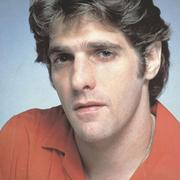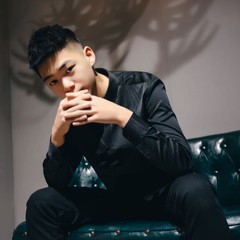Glenn Frey
老鹰乐队应该说是天才中的天才,说它是美国最伟大的摇滚乐团,一点也不为过。他们的专辑的销量超过了其他所有的美国乐队。迄今为止,他们专辑的销量在全球超过三亿八千万,赢得了四次最佳专辑,五次最佳单曲和四次葛莱美大奖。没有听过老鹰乐队的歌就不可能懂得什么是真正的摇滚乐! 1971年7月唐亨利(Don Henley)、伯尼利登(Bernie Leadon)、兰迪麦斯纳(Randy Meisner)、格伦弗雷(Glenn Frey)开始了实现他们梦想的征程。这群1947年、1948年出生的二十来岁的小伙子一出手便令大众刮目相看,四个人都擅长写词谱曲,都擅长演唱,因此在1972年乐队首张单曲《Take It Easy》便遍扫全美,排行榜第十二。同年推出的与乐队同名的专辑在“专辑销量榜”上排名第二十二。这一张专辑有着典型的乡村风格,是一张崇尚自然、歌颂自然的作品。吉他、班卓琴、滑弦琴相互交映,呈现出浓厚的乡村摇滚的气息。而在这张专辑的幕后有着一位日后鼎鼎大名的女歌手琳达伦丝苔特(Linda Ronstadt)。这位女歌手不但在女性世界是独一无二的,而且在某些方面与男性歌手相比也毫不逊色。她的歌路几乎涉及所有的摇滚乐种:乡村、民谣、游行、爵士等等,如果有一天她玩起重金属,我想广大乐迷也不会惊奇,因为它有与生俱来的歌喉:唱抒情歌曲时哀怨柔情,唱摇滚时激昂如虹。雄鹰乐队在一片叫好声中推出了他们的第二张专辑《Desperado》,这是一张概念唱片。整张专辑大概讲述这样一个故事:1880年的美国西部,21岁的杜林达顿(Dooling Dalton)由于误人歧途而触犯法律踏上吉凶未卜的征程。1974年由于唐弗尔德(Don Felder)的加入,以及唱片制作人的更替,乐队的风格有些偏重于摇滚,这一年推出的第三张专辑《边缘》(On The Border)既体现出此特点。同年的夏季,雄鹰乐队单曲《Best Of My Love》荣登排行榜冠军之位。在1974年,“雄鹰”乐队接连参加了几个大规模的演出,尤其是四月在乐队的发祥地加州举办的“加洲摇滚会串”艺术节上,在近二十万观众注目下,乐队树立起一个崭新的形象,成为西海岸音乐的主力军。此时的雄鹰乐队已完成了由早期的乡村摇滚向摇滚音乐的蜕变过程。1975年乐队推出的第四张专辑《这些夜晚之一》(One Of These Nights)荣登排行榜冠军。唐弗尔德(Don Felder)在此专辑里有出色的表现,尤其是那首标题曲。在该曲中,唐亨利的鼓颇有加重的趋势,而唐弗尔德(Don Felder)的吉他更带有炫技的色彩,在乐曲两分多钟时的一段吉他过门中充分体现出来。在这张专辑里与一首旋律极其流畅的中板歌曲《说谎的眼睛》于一九七五年获得葛莱美最佳流行歌曲奖.乐队的元老伯尼利登于1975年离队后,乔沃什(Joe Walsh)加入,这样乐队风格更接近纯摇滚.1976年是雄鹰乐队最为辉煌的一年,年底乐队推出的第五张专辑《加洲旅店》(《Hotel California》)莆一问世便赢得了一片叫好声,这张专辑被誉为七十年代美国最重要的专辑。在这张专辑里雄鹰以一种极为颓废暧昧的方式反映了70年代美国那种世风日下,混沌与散漫的社会风气。在这首标题歌曲中,唐弗尔德(Don Felder)和乔沃什(Joe Walsh)运用娴熟的吉他技巧,搭配出双吉他的神奇效果,而唐亨利(Don Henley)的嗓音显得异常嘶哑。歌词本身也很玄妙,充斥着一种超现实的意境,更似一个人的梦中呓语。大意是说走了很长很长路的旅客在落日时分见到了这加洲旅店,而这旅店十分热情地接待所有客人,只是这里有进无出,你在任何时间都可以去结帐,但你却出不了门。在这张专辑里的另一曲子《New Kid In Town》(《镇里的新小伙儿》)双双登上1977年葛莱美最佳录音奖和最佳声乐改编奖。《加洲旅店》(《Hotel California》)可以说是雄鹰乐队在最佳状态最佳组合时完成的旷世杰作。专辑混乱而低调内容使他成为70年代社会问题的代表作,销量在一千五百万张以上。终于,乐队的路走到了尽头,一九七九年推出的第六张专辑《The Long Run》成为乐队的最后一张专辑。这张专辑一共制作了18个月,在队员的一片争吵声中完成。虽然节奏感非常强烈的单曲“Heartache Tonight”非常流行,乐迷的捧场使她远超出白金蝶的销量,但不可否认,乐队的颠峰状态已经过去,专辑的整体水平有所下降。不过值得指出的是,该专辑的一首抒情歌《我无法告诉你为什么》(《I CAN'T TELL YOU WHY>)是由一位新人提摩西苏密特(Timothy B.Schmit)与格伦弗雷(Glenn Frey)合作演唱的。终于自一九八一年后乐队再也没有新曲推出,在跨入八十年代门槛时,这个名噪一时的雄鹰折翼断翅,烟消云散。解散后的雄鹰成员各自寻找自己的归宿,格伦弗雷(Glenn Frey)于1982年推出解散后的个人专辑,乔沃什乔沃什(Joe Walsh)于1981年,伯尼利登(Bernie Leadon)于1982年,兰迪麦纳斯(Randy Meisner)于1980年和1982年都各自推出个人专辑,虽也获得好评,但远不及乐队成功之时。而反省后的唐亨利(Don Henley)东山再起于1983年推出的专辑《肮脏的洗衣店》备受好评,销量相当不错。在进入九十年代时,唐亨利(Don Henley)又以一曲《告别纯真》(The enf of the innocence)获1990年葛莱美最佳摇滚男歌手的桂冠。如今的唐亨(Don Henley)利浑身透出成熟的男子特有的深沉和持重,坚持的而略含几分悲凉的沙哑的嗓音,略得更加朴实自然。1993年他和女歌手帕蒂史密斯合唱一曲《仅有爱情是不够的》(Sometime Love Just Isn`t Enough)又获得一片喝彩,因为这不是一首简单的情歌,而是一首从社会的角度审视爱情,探讨婚姻失败问题的作品。在进入1994年时,媒介就开始纷纷报道雄鹰乐队将重组。消息传来乐迷们一个个都兴奋异常,这意味着他们又将目睹这个在70年代名噪一时的超级乐队的风采。有道是合久必分,分久必合,果然,乐队于1994年又宣告东山再起,几位元老再次重聚。重组后的雄鹰立刻马不停蹄地开始全美巡回演出,并于该年推出一张新歌+精讯炼狱之上》(Hell Freeze Over ).专辑精选部分是演唱会的实况,鼎沸的人群、流畅的旋律又一次在耳边回荡。到底“姜是老的辣”,在演唱会上唐亨利(Don Henley)身着一件格子绒衬衣,在万众瞩目下又唱起那首脍炙人口的《加洲旅店》,而唐弗尔德(Don Felder)和乔沃什(Joe Walsh)的吉他技艺更件炉火纯青,开篇大段的吉他华彩奏得畅快淋漓,重重的鼓点仿佛击在人们的心房,亨利沙亚的嗓音坚实而富磁性,而乐队成员鬓际的白发尤见苍凉。这支超级乐队又一次踏上未知吉凶的漫漫征程。在这个喜新厌旧的时代,雄鹰还能象早先那样任意在天空翱翔吗?我们拭目以待。Eagles 作品记录1972年:推出第一张专辑《Eagles》(《雄鹰》),其中包括了三支美国排行榜热门金曲《Take it Easy》(《别紧张》),《Witchy Woman》(《女巫》)和《Peaceful Easy Feeling》(《和平容易感觉到》)。1974年:推出《On The Border》(《在边境线上》),其中《The Best Of My Love》成为他们第一支销量达百万的排行榜冠军单曲。1975年:乐队推出的《One Of These Nights》(《其中一个夜晚》)连续五周占据榜首位置。以及集锦《Their Greatest Hitsl971-1975》。1976年2月:乐队以《撒谎的眼》荣获格莱美奖,被授予最佳流行成就奖。同年,他们又推出另一张专辑《Hotel California》(《加州宾馆》),可以说是Eagles在最佳状态和组合下完成的旷世之作。1979年:出版的专辑《The Long Run》也倍受乐迷的青睐,高居榜首长达8周之久。其中的单曲《今夜心痛》排行第8位。1980年:推出《Eagles Live》成为又一张白金销量专辑。就在这一年,这群伟大的鹰各自单飞。1994年:在鹰迷们的翘首期待中,这支解散已14年的经典班霸再次组合。发表新专辑《The Very Best Of The Eagles》。2000年:出版《Selected Works 1972-1999》。 摘自艺术中国 by Bruce Eder & Jason AnkenyGlenn Frey is best known as one of the two most popular and longest tenured members (along with Don Henley) of the Eagles, and as an intermittently successful solo artist in the decades since that band ceased being a full-time working group. Although associated closely with the Eagles brand of Southern California-spawned laid-back country-rock, Freys origins were a long way away from either the place or the music that his work came to epitomize. He was born in Detroit in 1948, and grew up in Royal Oak, MI. Music was just one of many interests that drove him during childhood — a precocious youth, he was an avid reader and, despite his relatively small stature, a serious athlete in elementary and junior high school. He also took piano lessons from age five — at the insistence of his parents — until just before his teen years. His interests in high school included such advanced and outre subjects for the time as the writings of Jack Kerouac and the films and image of actor James Dean, who died when Frey was seven years old; they reflected a rebellious and aggressive nature that also manifested itself in an attraction to rock & roll. The music had come along during Freys childhood — he was seven when Rock Around the Clock shot to number one on the charts, and eight when Elvis Presley became a national phenomenon. In contrast to his future bandmate Timothy B. Schmit, Frey was never a would-be folkie, but jumped right into rock & roll, especially after he saw — at age 16 — how girls reacted to rock stars on stage.He took up the guitar in earnest after seeing the Beatles perform in 1964, and passed through several amateur and semi-professional Detroit-based bands in his late teens, including the Mushrooms, who became a major local attraction on the local television show Robin Seymours Swinging Time, and appeared regularly at a teen club called The Hideout, as well as cutting a single, Such a Lovely Child, for Hideout Records (produced by a somewhat older, more advanced local rocker named Bob Seger). The Mushrooms split soon after, and Frey joined the folk-rock group the Four of Us; he subsequently formed two more Detroit teen bands, the Subterraneans and the Heavy Metal Kids. Frey attended college somewhat reluctantly, preferring to devote most of his energy to playing music, chasing girls, and smoking marijuana — in the course of his early career, he did manage to sit in on a couple of sessions with Seger, and at age 19 played acoustic guitar and sang backup on Ramblin Gamblin Man from the latters Capitol Records debut in 1968.Frey eventually decided, however, that Detroit wasnt the place for him to launch a serious career in rock music and headed west to California. He was fortunate enough to make contact with John David Souther, a fellow Detroit transplant who was already a promising practitioner of what would soon be known as country-rock. He was dating Freys girlfriends sister, and he soon showed Frey how to play and sing country music, which was increasingly making itself felt in the rock music coming out of the Golden State. The two tried composing as a team, even landing a publishing contract that helped keep them going during those lean late-60s years, splitting 90 dollars a week between them — the publishing deal fell apart through their inability to write the kind of commercial material that was being sought, but in the course of writing together, they also developed a coherent sound that soon became very attractive, and something they could build on. Thus was born Longbranch Pennywhistle, a country-rock group whose timing was a little premature on a commercial level but not too soon to be signed to Amos Records, a small Los Angeles-based label. The groups self-titled album, which included Doug Kershaw, as well as Ry Cooder and the renowned L.A. sessionmen James Burton on guitar, Larry Knechtel on piano, and Joe Osborn on bass, never got the promotion it would have taken to make it a success. Souther and Frey kept making the rounds of the folk clubs in the city and the surrounding area, crossing paths with the likes of Jackson Browne — then an ex-member of the Nitty Gritty Dirt Band with some great songs to his credit as a composer — and Linda Ronstadt. Eventually, Frey, Souther, and Browne ended up sharing a house together, and the two of them sang on Brownes demo of Jamaica Say You Will. Browne was already being managed by David Geffen, who, at Brownes urging, also became Freys informal music business advisor. Meanwhile, he and Souther were forced to disband their own group in order to get out of the contract with Amos Records, which seemed like a dead end, and both spent a fair amount of time around The Troubadour, the club that constituted the folk-rock mecca for the West Coast. Frey wanted to try and form a new group, but was persuaded instead to consider going on the road backing Linda Ronstadt, who was about to tour in support of the release of her debut Asylum Records album, Silk Purse. Frey also met Don Henley, who was in a band called Shiloh — which was also signed to Amos Records and also getting nowhere fast — and persuaded him, in the course of their mutual commiserations, to join the band working behind Ronstadt. The ranks of the band, formed in the summer of 1971, eventually came to include Frey and Henley, and Randy Meisner, whod lately played with Rick Nelson on-stage and on the Rudy the Fifth album, and ex-Flying Burrito Brothers member Bernie Leadon. Within a short time, however, theyd made plans to separate themselves from Ronstadt and go off on their own. After a cold audition — with no advance demo tape — in front of Geffen, they had a manager and, after getting Frey out of his contract with Amos Records, they went to Colorado for some time off. There they worked out who they were and what their sound would be, picked up their first producer, Glyn Johns, took on the name the Eagles, and were signed to Geffens newly formed Asylum Records.Although all four members of the Eagles composed songs and sang, Frey and Henley quickly emerged as the two with the most commercial musical ears, Frey as co-author (with Jackson Browne) and lead singer on their first single, Take It Easy, which reached number 12 on the charts in the summer of 1972, and Henley as co-author (with Leadon) of Witchy Woman, which got to number nine that fall. Although the group had succeeded in attracting generally favorable press attention and reasonably good sales, with one Top Ten single and a debut album that peaked at number 22 in a seven-week run on the charts, Frey and Henley between them decided that this was not enough, and that their next album would have to be something more than just a body of good tunes and a couple of AM-friendly cuts — between them, they turned what became Desperado into a very ambitious (for the time) thematic-based concept album, which was something relatively unusual in country-rock. Frey and Henley also co-wrote the title track, which was perhaps the finest album track in the groups history (although its arguable that every track on Desperado that didnt make it onto a 45 fits into that category). Although the concept caught Leadon and Meisner by surprise, especially as songwriters, they quickly came aboard and Desperado ended up being one of the finest records ever to come out of the 70s country-rock scene.And it was a measure of the unity that the band still felt at this time that, when Desperado stalled on the charts just outside of the Top 40 and neither of its two singles did better than number 59 — mostly owing to disorganization of Asylum Records at the time, which was being sold and merged with Elektra Records — all of the members took this as a professional affront. Freys singing also improved markedly between the first two albums, and he was now effectively, with Henley, the one of two co-equal focal points in the band. By the time of their third album, a fifth Eagle had joined in the guise of Don Felder, whose guitar sound toughened up the bands overall sound, and especially their harder rock & roll side. By the time he joined, for the On the Border album, which marked a commercial comeback, peaking at number 17, the band had split into two divisions, with Frey and Henley more or less the stable core, while Leadon — who wasnt entirely happy over Felders guitar being added to their sound, when he wanted to play more straight-ahead electric guitar — and Meisner seemed to be part of a less cohesive unit just outside of that core. By the time they toured in support of their fourth album, One of These Nights, Leadon was on his way out, to be replaced by Joe Walsh, and Meisner followed out the door on the Hotel California tour. By that time, Frey and Henley (in coordination with their manager, Irving Azoff, a protégé of Geffens whod taken the latters place when he became too wired up in running his record label), as co-authors of the string of hit singles that included One of These Nights, Lyin Eyes, Take It to the Limit, Hotel California, New Kid in Town, Life in the Fast Lane, The Long Run, I Cant Tell You Why, and Heartache Tonight, and one or the other of them on lead vocals for all but two of those songs, were more or less running things. Walsh, Felder, and new member Timothy B. Schmit stayed along for the ride that continued through 1982, when Frey and Henley, in conjunction with the others — all of whom were now set up financially better than they ever could have dreamed, following a string of arena- and stadium-scale tours, hit singles, and three more multi-million-selling albums — put the group on hiatus. Whats more, the Eagles catalog continued to sell for decades after, on LP and CD, in multiple editions of the latter.Frey began a solo career in 1982 with No Fun Aloud, notching a pair of Top 40 hits with I Found Somebody and The One You Love. He also embarked on an unexpected acting career in the wake of 1984s The Allnighter, which spawned the hit Smugglers Blues, a song that subsequently inspired an episode of the hit TV series Miami Vice on which Frey guest starred; his acting work later continued in an extended guest role on the acclaimed Wiseguy as well as a starring turn in 1993s South of Sunset, which as a result of its premiere episodes 6.1 Nielsen rating — believed to be the lowest fall debut in major network history — was canceled after only one episode.Freys solo musical career reached its peak in 1985 with the Top Ten smash The Heat Is On, a single from the soundtrack to the Eddie Murphy comedy Beverly Hills Cop. Freys contribution to the Miami Vice soundtrack, You Belong to the City, was also a blockbuster, narrowly missing the top of the charts. However, his next solo LP, Soul Searchin, did not follow until 1988, notching only one Top 40 entry, True Love; Strange Weather, issued four years later, missed the charts altogether. After issuing Glenn Frey Live in 1993, he joined the reunited Eagles on their phenomenally successful Hell Freezes Over tour, with a live album of the same name reaching number one a year later. Since then, his releases have consisted of compilations of earlier solo work. In the late 90s, Frey co-founded his own label, Mission Records, with attorney Peter Lopez.


 The One You Love(Album Version) - Glenn Frey
The One You Love(Album Version) - Glenn Frey
























